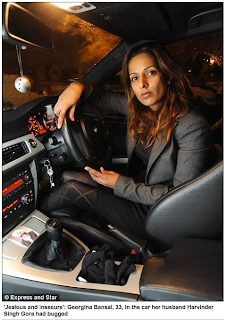The recent video enhancement post sparked additional interest in the subject. Upon doing some more research, it became clear that enhancing is only part of the picture. (Geez, I am starting to sound like Mr. Peabody.)
Even more important is investing in technology which works in the first place. For example, the video surveillance system required in a small store is not what works best for surveying a parking lot.
The following explanation at Jim Hoerricks' blog is really insightful and educational...
Can you zoom in on that license plate? Can you zoom in on his face? Why can't you make this image clearer. These are questions that many forensic video analysts deal with on a daily basis. To illustrate the answer to these questions, let's consider this image:
This Monitoring image comes from an Avigilon system's 16 megapixel camera.
With the above image in mind, let's consider the outstanding advice from the UK's Home Office Scientific Development Branch:
To judge the quality of images that will be necessary, you will need to take into account the purpose for which CCTV is used and the level of quality that will be necessary to achieve the purpose. The Home Office Scientific Development Branch (
HOSDB) recommends identifying the needs of a CCTV system by using four categories:
- Monitoring: to watch the flow of traffic or the movement of people where you do not need to pick out individual figures.
- Detecting: to detect the presence of a person in the image, without needing to see their face.
- Recognising: to recognise somebody you know, or determine that somebody is not known to you.
- Identifying: to record high quality facial images which can be used in court to prove someone’s identity beyond reasonable doubt.
Take a look at the picture above. Can you make out faces or license plates? No. So, if your purpose is to identify these items, that picture view just won't do.
With Photoshop, we can zoom in. Let's see what happens.


This Detecting view comes from zooming in a 16 megapixel image.
We can now see the people and vehicles more clearly. We can gain a general awareness of types of vehicles. We are closer to identifying them, but we don't have anything yet that will help us to prove identity beyond a reasonable doubt. We can zoom in further to see if we can Recognise anyone.
This Recognising view comes from zooming in a 16 megapixel image.
At this level of magnification, someone who knows this person or car should be able to say, "that's him" or "that's not the man/car you are looking for." At this point, we can begin to accurately describe the individual in the scene. Let's zoom in some more to see if we can positively identify this man and the car.
This Identifying view comes from zooming in a 16 megapixel image.
With a 16 megapixel image, we can even zoom in closer than this image. But notice what's happened along the way. We've sacrificed field of view for detail. No longer are we looking at the whole parking lot (monitoring). We can't see the other people who are walking around (detecting). In order to identify this individual, we've had to zoom in so far that we've excluded much of this scene from our view. A CCTV Installer might position a camera/lens combination at a choke point specifically to get facial recognition whilst installing other cameras around the area to monitor and detect movement of unauthorised persons.
But what about real life. The good folks at Avigilon have a small piece of a very large market. What if that same monitoring image was only 4CIF or 2CIF. Could we still zoom in and identify the individuals in the scene? You be the judge.
The image from Avigilon contains 15,824,256 pixels and can come in a lossless RAW format.
This image contains only 426,400 pixels and is compressed.
With an almost 97% reduction in the amount of available pixels and the additional compression, the results speak for themselves.
The result of zooming in on a low pixel count image.
























